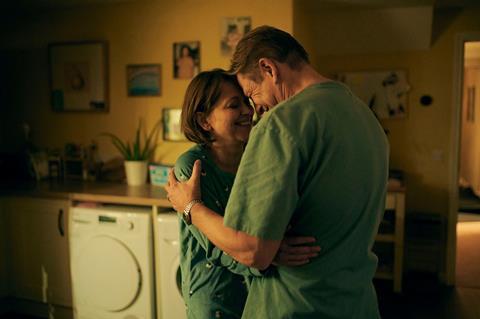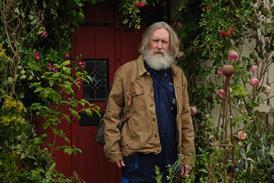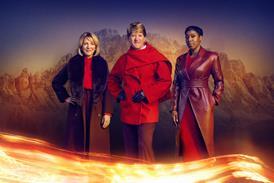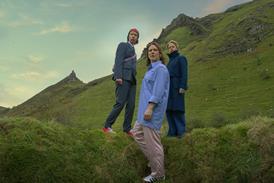“Gruellingly honest about the realities of long cohabitation, with its micro-niggles and unaddressed sorrows”

Marriage, BBC1
“The naturalistic dialogue feels almost improvised and it is through facial expressions and half-finished sentences that we understand everything going on under the surface of this marriage. Bean and Walker, at the absolute top of their game, deliver soaring emotion in the most subtle of ways. They convey so much even without words that you feel as though you are constantly aware of each of their inner monologues.”
Rachael Sigee, The i
“A portrait of the fascinating mundanity of ordinary human existence, of pain pushed down, of the quiet dysfunctionality of family relationships. Some of you, I accept, might have found it lacking pace, dull even, but I’d rather sit through hours of this than a silly plot twist and a car chase. And I think most of us could find a bit of ourselves in the scenarios unfolding, the low-level bickering, the banality, but also the moments of marital solidarity. The dialogue was sparse but that was fine, because you’ll find few actors who can communicate awkwardness, annoyance, distress, vulnerability using only their eyes and slight body movements as Bean and the brilliant Nicola Walker can. And few writers can bring this theatre of the prosaic to life like Stefan Golaszewski who wrote the near-perfect Mum. There were the beats and pulses of Mum here in the almost imperceptible grunts and sighs, the unsaids, the long, long silences. But unlike Mum there was no comedy.”
Carol Midgley, The Times
“Stefan Golaszewski’s portrait of a marriage won’t be for everyone. Gruellingly honest about the realities of long cohabitation, with its micro-niggles and unaddressed sorrows, the script’s rhythms shook its audience out of its complacency, aided by a jolting theme tune…Those first three episodes contained more pain than joy as grief and jealousy clustered like black clouds over two good but fearful people.”
Jasper Rees, The Telegraph
“There is a pitch-perfect realism to the way these characters talk without really saying anything, then put across what they really mean while saying nothing at all. It’s so cleverly done. When their daughter Jess comes to visit, bringing her new boyfriend, you want to shake every single one of them into listening to what is actually being said and to act on it. There is a lot of dithering, and a lot of keeping difficult conversations at arm’s length. This can be frustrating. It is an hour long, and you feel it. The tension it whips up – in Emma’s place of work, or in Ian’s lonely wandering, or at dinner with Jess’s creepy and controlling partner – can be genuinely unpleasant to sit through. But that is the point. This is all about the light and shade, the big and the small moments, what makes a marriage work and the cracks that can appear in it.”
Rebecca Nicholson, The Guardian
“It’s all terribly sad and sadder still for being so mundane. Life’s like that, of course – our unique sorrows are incomprehensible to outsiders, however wearily commonplace they are to us. Some of their mess was predictable. A running joke about her (Emma) new jacket, bought at a discount online, seems like a deliberate dig at Walker’s character and her power suits in the much more opulent BBC drama The Split. Other sources of strain well up from deeper, darker crevices..It might be everyday stuff, but it delivers a frisson of shock too. We spend so much of our lives in front of the box, but this time it feels as though the TV is seeing us too. The story of Emma and Ian is somehow utterly absorbing.”
Christopher Stevens, Daily Mail
A Very British Way of Torture, Channel 4
“With plenty of illuminating archive footage, the story revealed in the so-called Hanslope papers was revisited in all its grisliness. In another world – on the radio, say, or in a podcast – the survivors of rape and torture who took part would have had the floor to themselves. But their memories, doled out in short snippets, fed into a wider story about Britain’s vexed relationship with its past, and the unresolved culpabilities of Empire.”
Jasper Rees, The Telegraph
Afghanistan: Getting Out, BBC2
“(It) bagged an impressive cast of gnarled generals, secretaries of state and consiglieri who were in the room when the decisions were taken and now have reputations to burnish and perhaps, in the case of David Cameron, salvage. All had the impotent look of men swallowed up in history’s most ravenous maw…Drone shots of the parched interior, in all its pitiless beauty, silently mocked the hubristic folly of would-be conquerors. An advantage of hurtling up to 2014 in the first hour was to highlight in searing primary colours the Swiftian absurdities of what one general dubbed a “war for the people not with the people”. ”
Jasper Rees, The Telegraph
The Princess, Sky Documentaries
“But The Princess also displays a fine eye for oblique, jarring, mischievous moments where the curtain lifts and we see the machine whir and splutter…If The Princess has a definitive statement to make about Diana, it comes from that contrast: amid so much that was tawdry and bizarre, she somehow gave the impression of remaining pristine. Looking back, what she was trying to escape was peculiarly grim.”
Jack Seale, The Guardian





























No comments yet